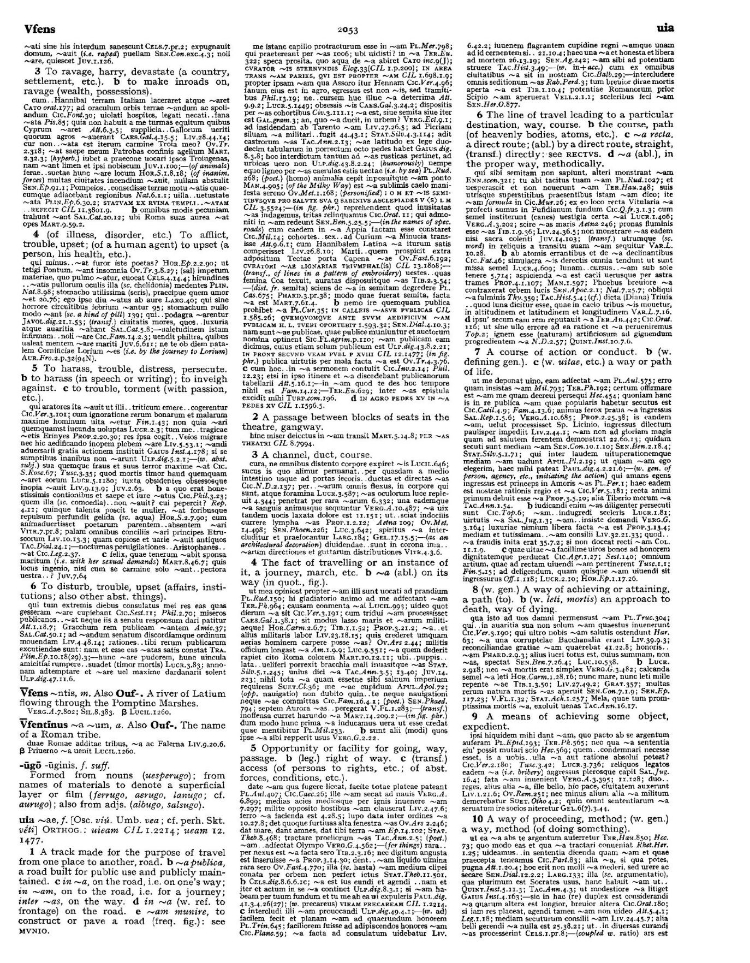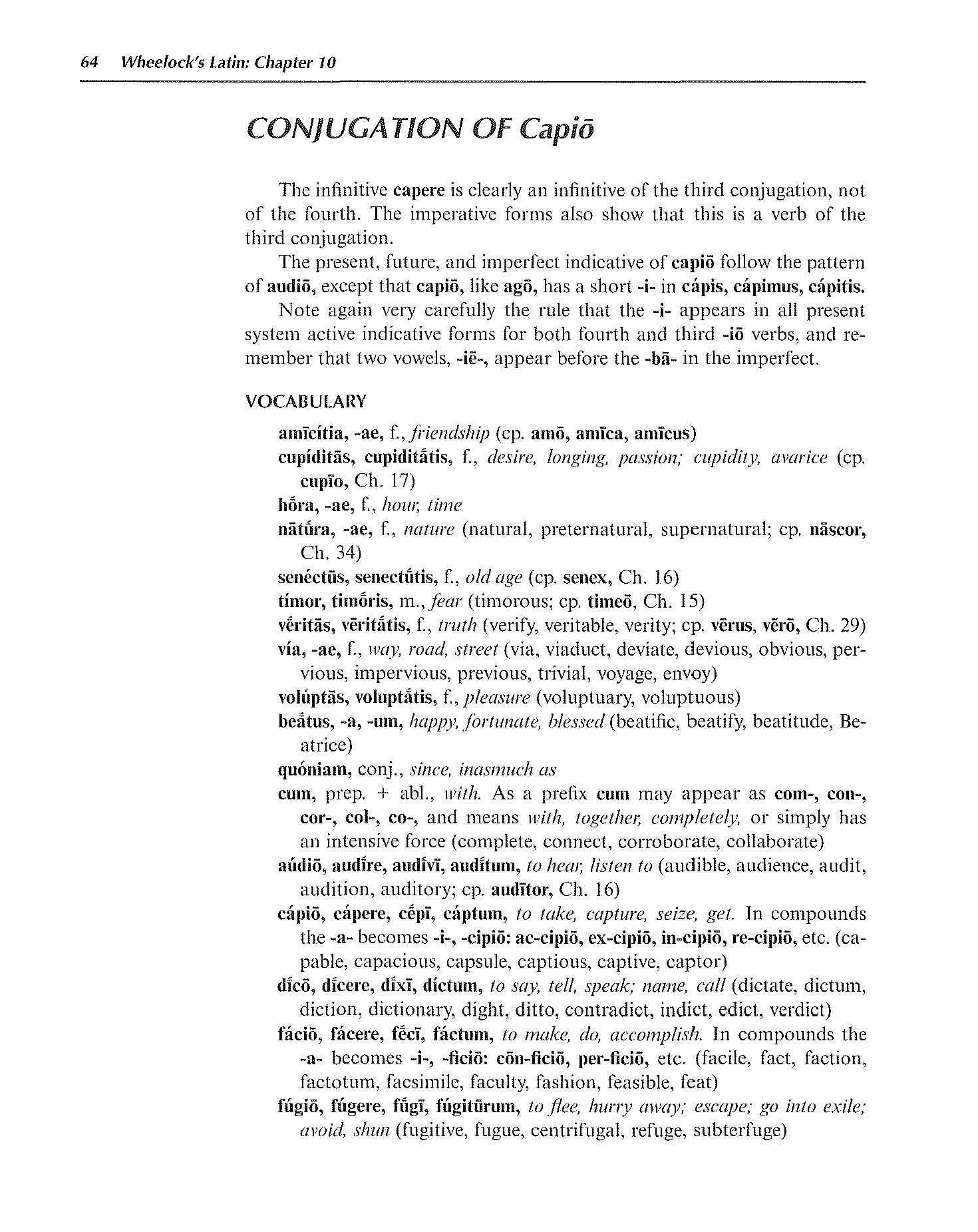
page_listing.tpl
page_subListingDetails.tpl
sub_listingDetails_style1.tpl
sub_listingDetails.title.tpl
via road
via is a Latin Noun that primarily means road.
Definitions for via
Wheelock's Latin
Noun
- 1
way, road, street
English derivatives:
via viaduct deviate devious obvious pervious impervious previous trivial voyage envoy
Oxford Latin Dictionary
Noun
- 1
A track made for the purpose of travel from one place to another, road. (b) a road built for public use and publicly maintained. (c) on the road, i.e. on one's way; on the road, i.e. for a journey; on the way. (d) (w. ref. to frontage) on the road. (e) to construct or pave a road (fre. fig.).
- 2
A passage between blocks of seats in the theater, gangway.
- 3
A channel, duct, course.
Sentences with via
Latin to English
Tyrannus viam in hanc cīvitātem invenit.Compare The tyrant is finding a way into this state.
Eōs in eādem viā vīdimus (vidēmus; vīderāmus).Compare We saw (see; had seen) them in the same street.
Dum per viam ambulo, amicum conspexi.Compare While I was walking along the road, I caught sight of my friend,
Puerī in viās urbis ēgressī mox lūdō appropinquābant.Compare The boys, having gone out into the streets of the city, soon were approaching the school.
Non est ad astra mollis e terris via.Compare There is no easy way to the stars from earth.
Occido a servus Milo in Appius via Clodius confiteor.Compare They confess that Clodius had been killed by Milo's slaves on the Appian Road.
Non iter tantum do, sed via etiam munio, pons facio, commeatus praebeo.Compare I not only granted a passage, but I made roads also, I built bridges, I provided supplies.
Romani non via tantum, sed tectum etiam proximus porta occupo.Compare The Romans had occupied not only the streets, but also the houses nearest the gate.
Declension table for via
Cactus2000
| Singular | Plural | |
| Nom. | via | viae |
| Gen. | viae | viārum |
| Dat. | viae | viīs |
| Acc. | viam | viās |
| Abl. | viā | viīs |
Data sources
Notes
- Definitions
- Frederick M. Wheelock, Wheelock's Latin, 6th ed., rev. Richard A. LaFleur (New York, NY: HarperCollins Publishers, 2005): 64.
- P. G. W. Glare, Oxford Latin Dictionary, Vols. 1-8 (Oxford: Clarendon Press, 1982): 2053.
- Word frequencies
- Christopher Francese, "Latin Core Vocabulary," Dickinson College Commentaries, last modified 2014, http://dcc.dickinson.edu.
- Paul B. Diederich, The Frequency of Latin Words and Their Endings, PhD diss., (Columbia University, 1939).
- Louis Delatte, Suzanne Govaerts, Joseph Denooz, and Etienne Evrard, Dictionnaire fréquentiel et index inverse de la langue latine [Frequency Dictionary and Inverse Index of the Latin Language] (Liège, Belgium: Laboratoire d'analyse statistique des langues anciennes de l'Université de Liège [L.A.S.L.A.], 1981): 120.
Bibliography
Allen, Joseph H. Allen and Greenough's New Latin Grammar for Schools and Colleges: Founded on Comparative Grammar. Edited by James B. Greenough, George L. Kittredge, Albert A. Howard, and Benjamin L. D'Ooge. Boston, MA: Ginn & Company, 1903.
Crystal, David. A Dictionary of Linguistics and Phonetics. 6th ed. Oxford, UK: Blackwell Publishing, 2008.
Delatte, Louis, Suzanne Govaerts, Joseph Denooz, and Etienne Evrard. Dictionnaire fréquentiel et index inverse de la langue latine [Frequency Dictionary and Inverse Index of the Latin Language]. Liège, Belgium: Laboratoire d'analyse statistique des langues anciennes de l'Université de Liège (L.A.S.L.A.), 1981.
Diederich, Paul B. The Frequency of Latin Words and Their Endings. PhD diss., Columbia University, 1939.
Francese, Christopher. "Latin Core Vocabulary." Dickinson College Commentaries. Last modified 2014. http://dcc.dickinson.edu/latin-vocabulary-list.
Gildersleeve, Basil L., and Gonzales Lodge. Gildersleeve's Latin Grammar: Third Edition, Revised, and Enlarged. 3rd ed. London, England: Macmillan and Co., 1903.
Glare, Peter G.W. Oxford Latin Dictionary. Vols. 1-8. Oxford, England: Clarendon Press, 1982.
Krüger, Bernd. "Latin Conjugation Tables." Cactus2000. Accessed May 5, 2023. https://latin.cactus2000.de/index.en.php.
Pierson, Nick. "Sound of Text." Accessed October 26, 2019. https://soundoftext.com.
Wheelock, Frederick M. Wheelock's Latin. 6th ed. Revised by Richard A. LaFleur. New York, NY: HarperCollins Publishers, 2005.
Wiktionary Contributors. "Victionarium." Wikimedia Foundation, Inc. Updated March 18, 2019. https://la.wiktionary.org/wiki/Victionarium:Pagina_prima.
Citation
Chicago (17th ed.)
Allo Contributors. "via, viae (n.) - Latin Word Definition." Allo Latin Dictionary. Last modified . Accessed February 19, 2026. http://ancientlanguages.org/latin/dictionary/via-viae.
Entry created on . Last updated on .







